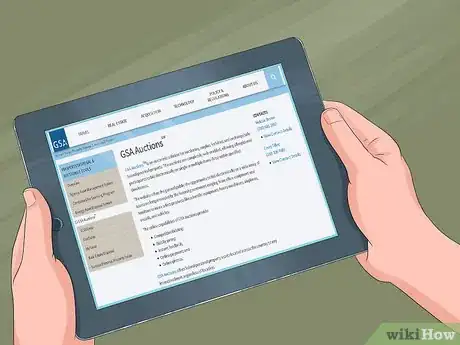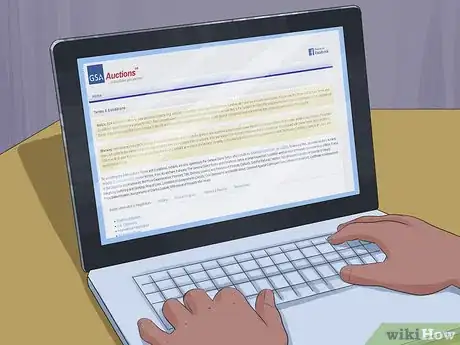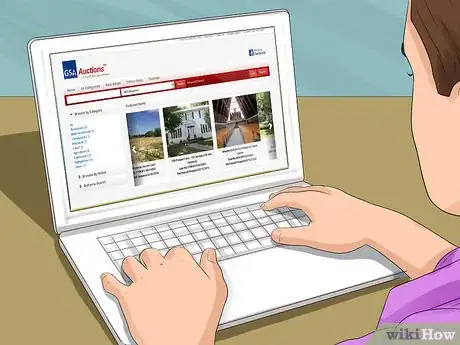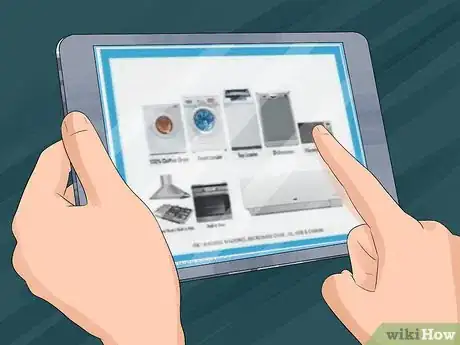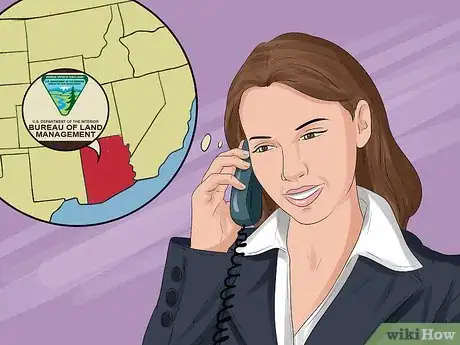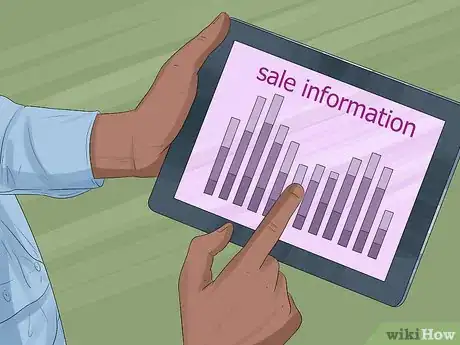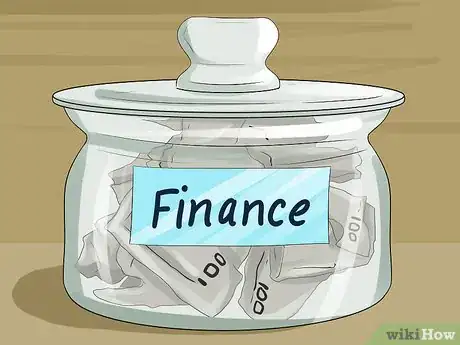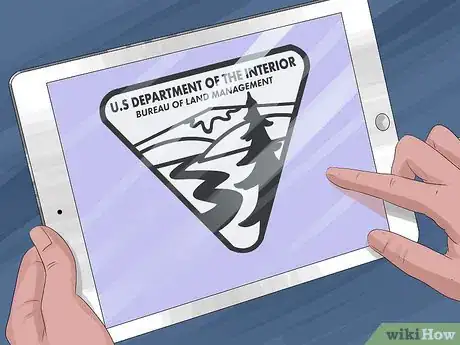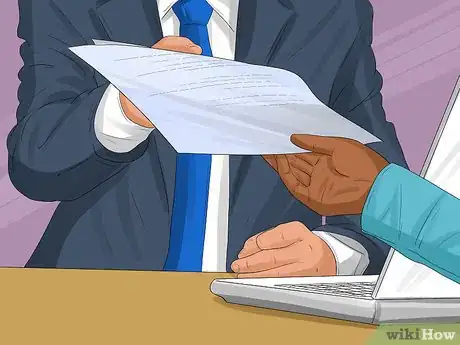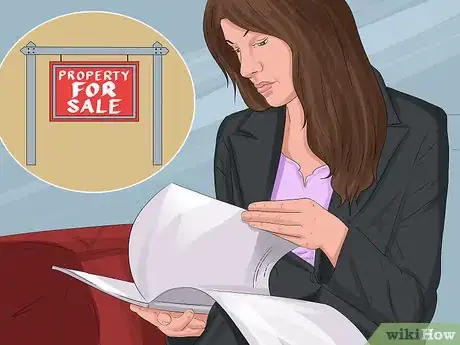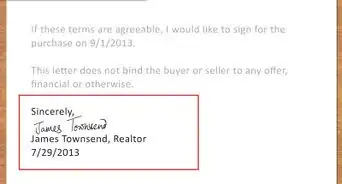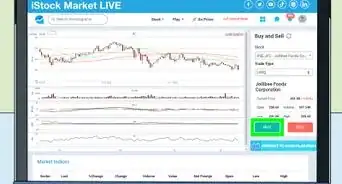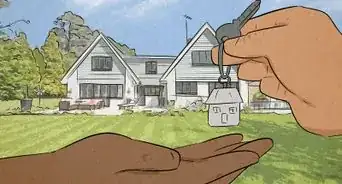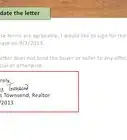This article was written by Jennifer Mueller, JD. Jennifer Mueller is an in-house legal expert at wikiHow. Jennifer reviews, fact-checks, and evaluates wikiHow's legal content to ensure thoroughness and accuracy. She received her JD from Indiana University Maurer School of Law in 2006.
There are 7 references cited in this article, which can be found at the bottom of the page.
This article has been viewed 28,555 times.
Federal and state governments occasionally sell surplus real property and undeveloped land to the public. While these sales typically are conducted by auction, don't think this means you can buy a house or parcel of land for one dollar – typically the government won't accept any bid less than the appraised fair market value of the property. The method you use to buy government surplus land varies somewhat depending on whether the land is owned by a state government or by the federal government, and whether the property includes buildings or is undeveloped land.[1]
Steps
Buying Federal Real Property
-
1Visit the GSA Auctions website. Real estate – developed property including buildings or other structures – that the federal government no longer needs is sold to the general public through online auctions run by the U.S. General Services Administration (GSA).[2] [3]
- Most auctions of real property are entirely web-based, so you can complete the entire bidding process electronically.
- Other types of property also are available on the website. For developed property, click on the "Real Estate" tab.
- Some property, primarily personal property such as vehicles, is available at offline sales. Information about these sales can be found under the "Other Sales" tab, although these sales typically don't include real property.
-
2Review the terms and conditions. Before you take any action to bid on government surplus real estate, confirm you are eligible to register as a bidder and can fulfill the financial requirements should you win an auction.[4] [5]
- Generally, bidders must be at least 18 years of age and must provide their date of birth at the time of registration.
- Although bidding overall is not limited to U.S. citizens, particular property may be limited to U.S. citizens depending on the type of property. This limitation will be included in information about the specific property.
- International bidders must complete additional registration requirements and provide photo identification and other documentation as included in the terms and conditions.
- You must have a credit card to become a registered user of the GSA Auctions website.
Advertisement -
3Create an account. Before you can bid on any properties listed on the GSA Auctions website, you must create an account with the website and register as a bidder. Once you create an account, you can place multiple bids at once provided you meet the minimum bid requirements for each property.[6] [7]
- You will be asked to provide personal identification information, a valid email address, and create your own username and password.
- Once you create an account, you can bid on any property with an active listing – the account is not restricted to any particular sale, and you are only allowed one active individual account at a time.
- The GSA will deactivate your account if you have no activity for a period of three years. If your account is deactivated, you'll have to create a new account.
-
4Browse available properties. You can look at properties actively listed with open auctions on the "Real Estate" tab of the GSA Auctions website. The tab includes filters you can check if you prefer to browse by location or type of property.[8] [9]
- If you see a property for which you want to bid, check out that property's invitation for bids (IFB) publication.
- The IFB itself is a government contract which becomes binding on both parties upon acceptance of your bid.
- In addition to pictures, description and map of the property, the IFB also contains the general terms of the sale and any special terms that apply specifically to that piece of property.
- Keep in mind that since the GSA handles real estate that was previously used by the federal government, it is typically commercial property, although some residential property is occasionally sold.
- You also can find the name and contact information of the Realty Specialist in charge of that particular property, if you have any questions not answered by the IFB.
-
5Place your bid. When you're ready to place your bid, you can do so directly from the website by completing the official bid form provided in that property's IFB along with the specified registration deposit.[10] [11]
- The amount of deposit required for each property is specified in that property's IFB.
- There may be a starting bid, but the starting bid is not necessarily the minimum bid. The starting bid is just used to establish the bidding process.
- For example, the auction may have a starting bid of $1, but that doesn't mean if you bid $2 and are the only bidder you will win the property for $2.
- The GSA reserves the right to refuse any bid, even a winning bid, if it does not correspond to the appraised fair market value of the property. The GSA is required by federal law to get at least fair market value for any property.
-
6Receive notice when the auction closes. After the auction closes, you will receive an email from the property's Realty Specialist if you were the winning bidder. This email will include information regarding the closing of the sale and final payment arrangements.[12] [13]
- After the auction closes, a date to close the sale will be established by the Realty Specialist in charge of that property. You are responsible for making the final payment to cover the remaining amount of your bid in full at that time.
- When you provide full payment for the property, the GSA will issue a quitclaim deed in your name.
- If you were not the highest bidder or if your bid was rejected for failure to reach fair market value, the GSA will contact you and refund your registration deposit as soon as possible after the close of the election.
Buying Federal Undeveloped Land
-
1Contact the regional office of the Bureau of Land Management (BLM). The Department of the Interior's BLM has responsibility for undeveloped land, most of which is located in the western United States. Any sales to the public are coordinated by the nearest regional office with jurisdiction over that property.[14]
- Keep in mind that undeveloped land is offered for sale to the general public rarely. These tracts typically are small, isolated parcels, and very few have any agricultural potential.
- Land also may be sold that was acquired by the government for a specific purpose or public objective and is no longer suited or needed for the reason it was originally acquired.
- Almost all land for sale by the BLM is located in Alaska, Arizona, California, Colorado, Idaho, Montana, Nevada, New Mexico, Oregon, Utah, or Wyoming.
- There are other small tracts occasionally for sale in other states in the western and mid-western United States.
-
2Evaluate sale information. Each BLM regional office has brochures for any undeveloped land in its jurisdiction that is available for public sale. These brochures provide detailed information about the property, including its precise location and basic characteristics of the property.
- Land types vary widely – almost all are isolated tracts that are difficult to manage. A few of these parcels are several hundred acres in size.
- While federal law requires these parcels to be sold at fair market value, there is no average cost for these lands.
- The sales brochure will describe the type of property, whether it is suitable for development with access to electricity and running water, and whether it has any agricultural potential.
- You also will have access to the fair market value appraisal and any encumbrances such as easements that may affect the value of the property.
-
3Determine auction details. The BLM conducts sales by oral bid, seal bid, or a combination of both. Auctions are held either somewhere near the property to be sold or at the regional BLM office that has jurisdiction over that property.
- If the sale is conducted by oral bid, it's not necessary for you to be there in person – you can be represented by an agent. However, it's typically in your best interests to be there yourself so you have the opportunity to inspect the property before bidding.
- For sales conducted using a sealed bid process, you can get details regarding the dates when bids will be accepted from the BLM regional field office conducting the sale.
- Sealed bids must be received by the specified deadline using the official bid form supplied by the BLM. Any additional requirements will be included in the legal sale notice.
- Sealed bids will only be accepted if they are received by the deadline and meet all requirements and conditions that are specified for that property.
-
4Arrange financing. You must pay an established percentage of the full price of the property with each bid, and the balance must be paid in full within a brief period of time after the auction closes or the deed won't be issued, so it's a good idea to arrange financing, if necessary, before you attend the auction.
- If the auction closes and you are the winning bidder, you will have only 180 days from the sale date to pay the balance of your bid in full.
-
5Make your bid. While specific procedures will vary depending on the type of auction being conducted, typically you arrive at the location of the auction, register as a bidder, and place your bid along with the deposit.
- Keep in mind that the BLM can only sell public land to U.S. corporations or citizens over 18 years of age.
- The minimum accepted bid is the appraised fair market value of the property. The property goes to the highest bidder.
- In an oral auction, you must submit a non-refundable deposit of at least 20 percent of the bid amount before close of business on the day of the auction.
- For sealed bids, you must mail your deposit using the BLM form along with a deposit of guaranteed funds for at least 10 percent of your bid amount by the deadline set for that property.
-
6Receive notice of the auction's outcome. If you attended an oral auction, you will know the winning bidder immediately upon close of bidding. However, for sealed bids, you will have to wait until after the bids are opened.
- Typically the winning bidder will be notified within a week of the date the bids are opened, which will be specified in the auction details.
- Once notified, you have 180 days to pay the balance of your bid to close the sale on the property.
- When full and final payment is received, the BLM will issue you a quitclaim deed for the property.
- If you were not the winning bidder for property auctioned through sealed bids, the BLM will return your deposit typically within a week of opening the sealed bids. Checks are returned using a trackable shipping method.
Buying State-Owned Surplus Property
-
1Contact the appropriate agency. Each state has its own land management agency that has responsibility for state government land. The name of the agency varies depending on the state, but look for an agency that has "land management" or "natural resources" in its title.[15]
- Typically state governments have greater amounts of property for sale than does the federal government. One reason for this is that federal law requires the federal government to first offer public lands to state governments before selling it to the public.
- The easiest source for information on public sales and auctions of state-owned surplus property may be the website of the appropriate state government agency.
- Typically, the website will include details regarding the types of property normally sold and the auction methods used. You may even be able to find information about specific properties or dates for public auctions.
-
2Review property for sale. If state real property is currently and actively listed for sale to the general public, you typically have the ability to review details about that property either online or by visiting an office of the state's land management agency.[16]
- The state also may have a mailing list for people interested in purchasing surplus land. For example, the state of New York gives you the opportunity to sign up for property sales notifications, so you can receive an email when state-owned surplus property is being sold.
- New York, Michigan, and other states have websites specifically devoted to the sale of surplus properties, some of which are available for immediate sale without going through an auction process.
- Property typically is sold as is, without any warranties or guarantees, and will not be sold for less than fair market value.
-
3Register as a bidder. Before you bid on a state property for sale, you typically must register as a bidder and meet the basic eligibility requirements established by state law. These requirements vary among states and within states, depending on the type of property you want to buy.[17]
- At a minimum, all states require bidders to be 18 years of age. In some states, you must be a resident of the state or be purchasing the property on behalf of a business incorporated or licensed to do business in the state.
- If property is sold online through a website, you typically must create an account with the website and provide credit card information.
- You typically have the ability to bid on multiple properties at once, but keep in mind that you must provide a deposit and be prepared to close the sale if you win the auction for the property.
- If you're looking at a property that is offered for immediate sale, you'll have to be prepared to pay the full price shown when you purchase the property.
-
4Bring deposit funds. In most states, if you want to bid on any state-owned real property, you must have certified funds equal to a minimum percentage of the amount you plan to bid – typically at least 10 percent – along with you when you register your bid.[18]
- Property may be available for immediate sale. This usually is the case if the property was already offered at an auction but no bidders offered the minimum bid or higher – where the minimum bid typically is the fair market value of the property.
- If you're looking at a property that is available for immediate sale, you won't have to put down a deposit, but you will have to be prepared to make a full and final payment for the complete purchase price.
-
5Receive notice of a winning bid. If you participated in an auction, the state agency will notify you if your bid is accepted as the winning bid. You typically have a limited time to pay the remainder of the amount of your accepted bid or you may lose the property.[19]
- The government isn't going to finance the property for you, so if you don't have the cash on hand you'll have to arrange your own financing to make the full and final payment for the property.
- Once payment is made, the state will issue you a quitclaim deed for the property. State governments make no guarantees regarding the title to the property, and the property may be subject to liens or other encumbrances.
- Keep in mind that state-owned property often was acquired by the state because the previous owner failed to pay property taxes. Any property taxes owed on the property also must be paid as part of your payment on the property.
- As soon as possible after you've purchased the property, it is in your best interest to have a full survey complete by a licensed property surveyor.
References
- ↑ https://www.usa.gov/auctions-and-sales#item-36767
- ↑ http://www.gsa.gov/portal/content/102085
- ↑ https://gsaauctions.gov/gsaauctions/aucitsrh/
- ↑ https://gsaauctions.gov/html/static/terms.htm
- ↑ https://gsaauctions.gov/html/static/faq.htm#A3
- ↑ https://gsaauctions.gov/html/static/faq.htm#A3
- ↑ http://www.gsa.gov/portal/content/102085
- ↑ https://gsaauctions.gov/gsaauctions/aucitsrh/
- ↑ https://gsaauctions.gov/html/static/faq.htm#A3
- ↑ https://gsaauctions.gov/html/static/faq.htm#A3
- ↑ https://gsaauctions.gov/html/static/terms.htm
- ↑ https://gsaauctions.gov/html/static/faq.htm#A3
- ↑ https://gsaauctions.gov/html/static/terms.htm
- ↑ https://www.usa.gov/auctions-and-sales#item-36767
- ↑ http://www.recreation.gov/marketing.do?goto=/FAQs/faqbuyland.html
- ↑ http://www.michigan.gov/documents/dnr/RulesandRegulations_216761_7.pdf
- ↑ http://www.michigan.gov/documents/dnr/RulesandRegulations_216761_7.pdf
- ↑ http://www.michigan.gov/documents/dnr/RulesandRegulations_216761_7.pdf
- ↑ http://www.michigan.gov/documents/dnr/RulesandRegulations_216761_7.pdf
